Greek Mathematical Thought
and the
Origin of Algebra
Jacob Klein
Translated by Eva Brann
Dover Publications, Inc.
New York
Copyright 1968 by The Massachusetts Institute of Technology.
All rights reserved.
This Dover edition, first published in 1992, is an unabridged and unaltered republication of the edition published by The M.I.T Press, Cambridge, Massachusetts, in 1968. The original German text was published as Die griechische Logistik und die Entstehung der Algebra in Quellen und Studien zur Geschichte der Mathematik, Astronomie und Physik, Abteilung B: Studien, Vol. 3, fasc. 1 (Berlin, 1934), ). The translation of Vietas Introduction to the Analytical Art which appears in the Appendix is by the Reverand J. Winfree Smith. This edition is published, by special arrangement with The M.I.T. Press, 55 Hayward Street, Cambridge, Massachusetts 02142.
Library of Congress Cataloging-in-Publication Data
Klein, Jacob, 18991978.
[Griechische Logistik und die Entstehung der Algebra. English]
Greek mathematical thought and the origin of algebra / by Jacob Klein; translated by Eva Brann.
p. cm.
Unabridged and unaltered republication of the edition published by the M.I.T. Press, Cambridge, Massachusetts, in 1968 T.p. verso.
Includes bibliographical references (p. ) and indexes.
ISBN 0-486-27289-3
1. Mathematics, Greek. 2. AlgebraHistory. I. Title.
QA22.K513 1992
Manufactured in the United States by Courier Corporation
27289306
www.doverpublications.com
Authors note
T HIS STUDY was originally written and published in Germany during rather turbulent times. Were I writing it today, the vocabulary would be less scholarly, and the change from the ancient to the modern mode of thinking would be viewed in a larger perspective.
Some of the references could have been brought up to date and made more accessible to English-speaking readers, but this would have entailed a labor out of proportion to its usefulness. However, a few additions to the references as well as some minor changes in the text have been made by the translator and by myself.
JACOB KLEIN
St. Johns College
Annapolis, Maryland
November 1966
Translators note
T HE GREEK word arithmos is rendered in the German text as Anzahl: a number of [things] to distinguish it from our modern Zahl: number. Since English approximations to Anzahl are either obsolescent (e.g., tale) or awkward (e.g., counting-number, numbered assemblage), Anzahl, like Zahl, has been rendered simply as number, although it is a chief object of this study to show that Greek arithmos and modern number do not mean the same thing, that they differ in their intentionality, for the former intends things, i.e., a number of them, while the latter intends a concept, i.e., that of quantity (cf. ). Intentionality and conceptualization are both used to translate the German word Begrifflichkeit.
is rendered in the German text as Anzahl: a number of [things] to distinguish it from our modern Zahl: number. Since English approximations to Anzahl are either obsolescent (e.g., tale) or awkward (e.g., counting-number, numbered assemblage), Anzahl, like Zahl, has been rendered simply as number, although it is a chief object of this study to show that Greek arithmos and modern number do not mean the same thing, that they differ in their intentionality, for the former intends things, i.e., a number of them, while the latter intends a concept, i.e., that of quantity (cf. ). Intentionality and conceptualization are both used to translate the German word Begrifflichkeit.
The following Greek terms occur so frequently that they have been incorporated into the text in transliterated form:
asthesis sense perception
sense perception
aisthetn object of sense
object of sense
analoga proportion
proportion
aristos [dys] indeterminate, infinite [dyad]
indeterminate, infinite [dyad]
peiron sb.: the limitless, infinite
sb.: the limitless, infinite
apdeixis demonstration, [strict] proof
demonstration, [strict] proof
apora quandary
quandary
arch, pl. archa [governing] source, beginning
[governing] source, beginning
chorisms separation
separation
dinoia [the faculty and activity of] thinking
[the faculty and activity of] thinking
dnamis power
power
eidetiks adjective from eidos
adjective from eidos
edos, pl. ede literally: looks; kind, form, species, idea; sometimes: figure
literally: looks; kind, form, species, idea; sometimes: figure
epistme Lat. scientia, knowledge, science
Lat. scientia, knowledge, science
gnos, pl. gene genus, family, class; often: the higher eide
genus, family, class; often: the higher eide
hen one
one
hle material
material
ida = eidos
= eidos
koinn sb.: common thing
sb.: common thing
koinona ton eidn community of the eide
community of the eide
kat to plthos according to multitude
according to multitude
kath aut by itself
by itself
kathlou pragmatea general treatment or study
general treatment or study
kat edos according to kind
according to kind

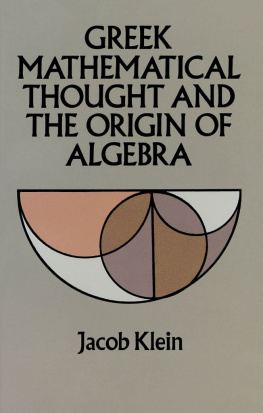
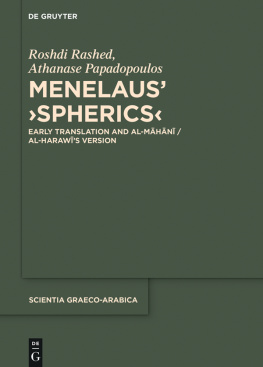
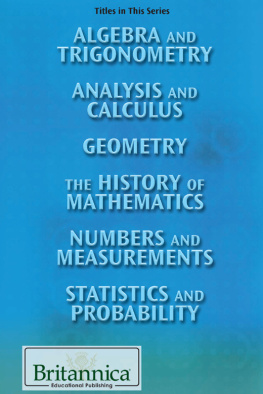
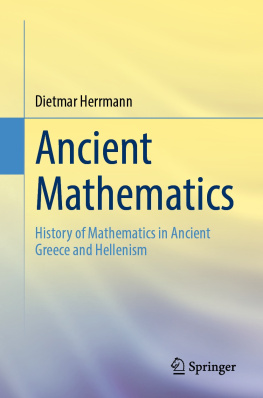
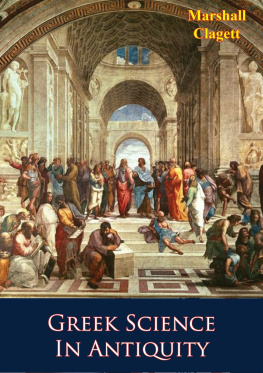

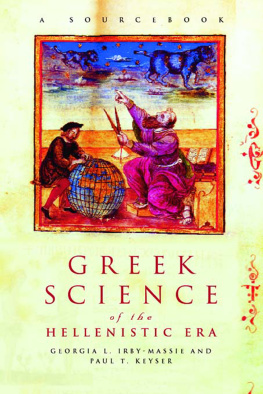
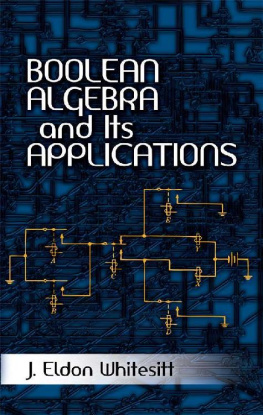
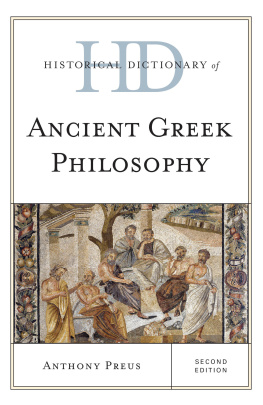

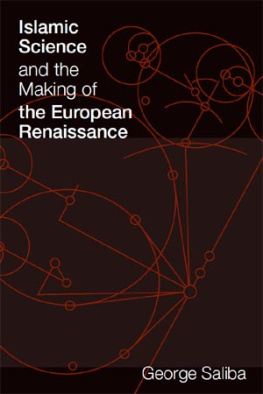

 is rendered in the German text as Anzahl: a number of [things] to distinguish it from our modern Zahl: number. Since English approximations to Anzahl are either obsolescent (e.g., tale) or awkward (e.g., counting-number, numbered assemblage), Anzahl, like Zahl, has been rendered simply as number, although it is a chief object of this study to show that Greek arithmos and modern number do not mean the same thing, that they differ in their intentionality, for the former intends things, i.e., a number of them, while the latter intends a concept, i.e., that of quantity (cf. ). Intentionality and conceptualization are both used to translate the German word Begrifflichkeit.
is rendered in the German text as Anzahl: a number of [things] to distinguish it from our modern Zahl: number. Since English approximations to Anzahl are either obsolescent (e.g., tale) or awkward (e.g., counting-number, numbered assemblage), Anzahl, like Zahl, has been rendered simply as number, although it is a chief object of this study to show that Greek arithmos and modern number do not mean the same thing, that they differ in their intentionality, for the former intends things, i.e., a number of them, while the latter intends a concept, i.e., that of quantity (cf. ). Intentionality and conceptualization are both used to translate the German word Begrifflichkeit. sense perception
sense perception object of sense
object of sense proportion
proportion indeterminate, infinite [dyad]
indeterminate, infinite [dyad] sb.: the limitless, infinite
sb.: the limitless, infinite demonstration, [strict] proof
demonstration, [strict] proof quandary
quandary [governing] source, beginning
[governing] source, beginning separation
separation [the faculty and activity of] thinking
[the faculty and activity of] thinking power
power adjective from eidos
adjective from eidos literally: looks; kind, form, species, idea; sometimes: figure
literally: looks; kind, form, species, idea; sometimes: figure Lat. scientia, knowledge, science
Lat. scientia, knowledge, science genus, family, class; often: the higher eide
genus, family, class; often: the higher eide one
one material
material = eidos
= eidos sb.: common thing
sb.: common thing community of the eide
community of the eide according to multitude
according to multitude by itself
by itself general treatment or study
general treatment or study according to kind
according to kind